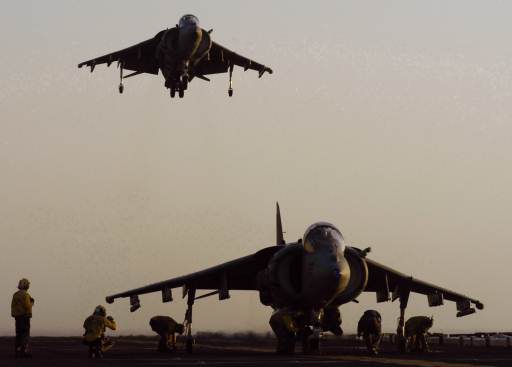
|
| AV-8B Harriers operating in Afghanistan. Image from the US Department of Defense. |
Friday night's "well-coordinated" suicide assault on Camp Bastion resulted in the destruction of six US Harrier strike aircraft and significant damage to two others. The members of the suicide assault team wore US Army uniforms and "appeared to be well equipped, trained and rehearsed," the International Security Assistance Force said.
The nighttime attack, in which a suicide assault team penetrated the perimeter of Camp Bastion, a sprawling base in the Desert of Death in Helmand province, resulted in the death of two ISAF soldiers. Eight other ISAF troops and a civilian contractor were wounded in the attack. Fourteen members of the assault team were killed and one more was wounded and captured.
"The attack commenced just after 10 p.m. when approximately 15 insurgents executed a well-coordinated attack against the airfield on Camp Bastion," ISAF said in a statement that provided additional details on the attack. "The insurgents, organized into three teams, penetrated at one point of the perimeter fence."
The members of the jihadist assault team were "dressed in U.S. Army uniforms and armed with automatic rifles, rocket propelled grenade launchers and suicide vests."
Once inside the perimeter, the assault team "attacked coalition fixed and rotary wing aircraft parked on the flight line, aircraft hangars and other buildings."
ISAF confirmed that six AV-8B Harrier strike aircraft "were destroyed" and two more "were significantly damaged." Although ISAF did not state which country owned flew the aircraft, the US Marine Corps is the only military branch flying Harriers in Afghanistan. The aircraft cost an estimated $30 million each.
Additionally, "three coalition refueling stations were also destroyed. Six soft-skin aircraft hangars were damaged to some degree."
ISAF said on the day of the attack that it "has determined that despite the damage, there will be no impact to ground or air operations from Camp Bastion."
However, a US Marine aviation officer familiar with operations in southern Afghanistan disagreed. The Harriers are used to provide close air support for Coalition forces conducting combat and counterinsurgency operations in the south, and with eight of the aircraft taken offline, there will be less to support these missions.
"Our resources in the south -- including aircraft -- are already stretched," the officer told The Long War Journal. "We couldn't afford this loss, and our troops on the ground are going to feel this."
Friday's complex attack on Bastion is very similar to a host of other assaults on major bases in Afghanistan and Pakistan that have taken place over the years. An alliance of jihadist groups, that include the Pakistani and Afghan Taliban, al Qaeda, Harkat-ul-Jihad-al-Islami, Jaish-e-Mohammed, and other terror groups have penetrated bases and targeted aircraft and other personnel. [See LWJ report, Jihadists launch complex assault on Camp Bastion in Helmand, for a list of the more significant attacks since 2009.]
Correction/update: the article was updated to note that the Harriers were from the US Marine Corps. The British military retired its Harriers two years ago. In the past, Harriers were stationed in Afghanistan.